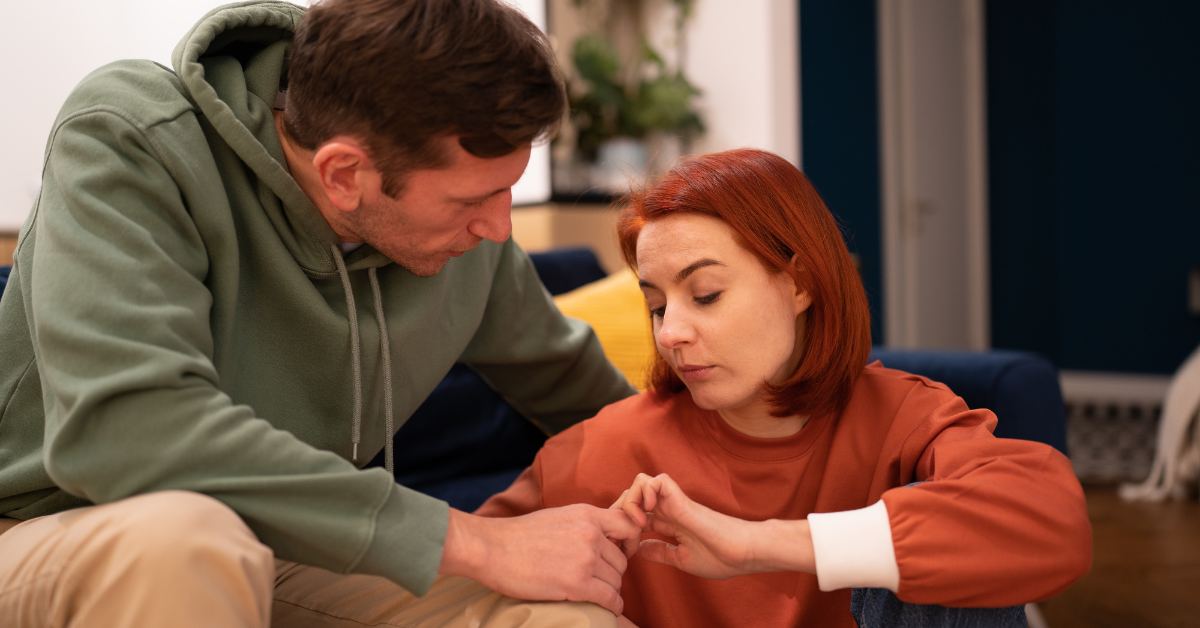In this article, we will discuss How To Respond To No One Cares. When feeling as though no one cares, it can be not easy to cope. It is important to remember that strategies and resources are available to help individuals who feel this way.
This article will provide an overview of various techniques that may help people respond healthily when they experience the sensation that nobody cares. These strategies include:
- Understanding why one feels this way
- Connecting with people
- Taking care of oneself
- Seeking professional help
- Practicing self-care
- Finding healthy ways to express feelings
- Volunteering
- Being kind to oneself
- Taking small steps toward change.
How To Respond To No One Cares: When faced with a “No one cares” attitude, rise above negativity. Embrace your passions and self-worth. Surround yourself with supportive individuals. Your voice matters, and your enthusiasm can inspire others.
Understand Why You Feel This Way

Recognizing that one may feel as though no one cares can be an emotionally challenging experience. It is important to understand why this feeling exists to learn how to cope with it.
Often, when people feel forgotten or unimportant, they respond to feelings of rejection and isolation. They may have experienced a lack of emotional support from family or friends and now feel disconnected from their loved ones. When those around them don’t seem to care or pay attention, they may feel lonely and hopeless.
In these cases, it is important for the individual to focus on building a solid sense of self-worth and inner resilience. Finding ways to practice self-care and express appreciation for oneself can help build confidence and increase feelings of belonging.
Additionally, engaging in activities that bring joy, such as spending time outdoors or pursuing hobbies, can help foster positive emotions even during hard times.
Finally, reaching out for assistance when needed can provide comfort when it feels like nobody cares about you or your struggles. Seeking counseling services or connecting with supportive friends can open up new pathways for understanding the situation better and developing healthier coping strategies in the future.
Connect with People
Acknowledging the sentiment that others may not share one’s interests, it is important to note the need for connecting with people.
Finding ways to make meaningful connections with individuals who have similar values and goals can be a powerful way to combat loneliness and feelings of being neglected. Establishing a sense of belonging can help people find purpose in life and increase their self-worth.
One way to connect with others is by sharing stories about oneself. Hearing each other’s life experiences can help create an understanding between two people, as well as establish common ground.
Another method is through engaging in activities that bring joy and fulfillment. When people come together over shared passions or hobbies, they are able to form lasting bonds that will last beyond any given activity or event.
In addition, forming relationships with mentors can provide a great source of support when feeling discouraged or overwhelmed by life’s challenges.
Having someone experienced in the field you are interested in pursuing can give helpful advice on how to navigate difficult decisions or situations effectively.
Mentors also serve as role models who have achieved success themselves; seeing someone else succeed at something inspires confidence and encourages perseverance even during tough times.
Building meaningful relationships requires patience and effort but it is worth it in the end when one has created a supportive network around them filled with like-minded individuals who care about their wellbeing and growth both emotionally and professionally while providing opportunities for reciprocation of care and kindness.
Take Care of Yourself

Taking care of oneself is an essential part of maintaining a healthy lifestyle. Self-care involves taking time to understand one’s needs and how to meet them.
It includes knowing what activities help restore energy, reduce stress, and increase physical and emotional well-being.
Building self-care strategies can help build resilience when faced with difficult situations like feeling that no one cares.
Self-care should be tailored to individual needs and preferences but may include activities such as exercise, spending time with friends or family, eating healthy meals, or reading a book.
Taking regular breaks from work or study can also provide much-needed restorative time away from the sources of stress in life.
Additionally, engaging in creative pursuits such as writing, art making, or gardening offers a sense of accomplishment while also allowing for relaxation and mindfulness.
It can be hard to take care of oneself when facing feelings that no one cares about; however, recognizing the importance of doing so is key to developing coping skills during challenging times.
Allowing yourself moments where you do things just for you can make it easier to move on from these negative thoughts and emotions so they don’t become overwhelming or cause long-term harm.
Everybody deserves respect and love; by caring for ourselves we create space for those around us to do the same.
Seek Professional Help
Seeking professional help can be beneficial in addressing feelings of loneliness or lack of care from others. Professional counselors can provide support, guidance, and an unbiased perspective on a person’s experiences.
They can also offer strategies to improve relationships with family and friends. Additionally, they may provide referrals to other community services that could benefit the individual.
Being able to talk openly with someone who is not part of one’s personal life can foster a sense of safety when discussing difficult topics. Professional counselors are trained to listen without judgment and offer insights into one’s challenges in a non-threatening way.
This creates an atmosphere in which the individual feels heard and accepted for their feelings and experiences.
A professional counselor may also share techniques such as cognitive behavioral therapy (CBT) or mindfulness exercises that can reduce stress or help regulate emotions associated with feeling disconnected from loved ones.
Through this type of therapy, individuals learn new ways to respond to stressful situations that allow them to cope better emotionally while maintaining healthy connections with the people around them.
Taking care of oneself is essential for well-being even when it seems like no one cares. With the help of a trained professional, individuals facing difficult emotions due to a lack of caring can gain insight into their situation and create an action plan tailored specifically for them in order to move forward in a meaningful way toward feeling connected again.
Practice Self-Care

Practicing self-care can be a critical component of addressing feelings of isolation and lack of support from others.
Self-care involves engaging in activities that are beneficial to one’s physical, mental, and emotional health.
This could include things such as setting aside time to exercise or practice mindfulness, getting enough sleep, eating nutritious foods, spending time outdoors, and developing meaningful connections with others who provide encouragement and understanding.
Additionally, it is important to take regular breaks from stressful situations or environments in order to restore balance within one’s life.
When feeling alone or unsupported by others, it may be difficult for individuals to find joy in everyday activities; however, prioritizing self-care can help alleviate these negative emotions.
Taking the initiative to invest energy into oneself gives an individual a sense of control over their own life which can foster confidence and build resilience over time.
Furthermore, taking the right steps toward self-care can increase motivation and productivity while simultaneously reducing feelings of stress or anxiety.
Creating healthy habits that involve engaging in mindful activities can help individuals further accept themselves as well as become more connected with their inner selves.
Moreover, building relationships with people who share similar interests also provides opportunities for meaningful conversations which could ultimately lead to greater understanding and support from others around them.
Self-care is an essential part of managing any kind of difficulty or obstacle presented in life; when embraced on a regular basis it has the potential to bring about positive changes both physically and emotionally.
It helps provide strength during times when feeling low by allowing individuals the opportunity to recognize what they need most in order to feel comforted and cared for even when no one else does so at that moment in time.
Find Healthy Ways to Express Your Feelings
Finding healthy ways to express emotions can be an important part of managing feelings of isolation and lack of support from others. It is essential to recognize that the emotions felt are valid and should be addressed in a constructive manner.
Identifying strategies to cope with rejection, such as engaging in activities that bring joy, talking with supportive friends or family members, or journaling one’s thoughts and feelings can help people feel empowered and connected. Additionally, seeking professional help if needed can provide guidance for further emotional growth.
It is also important to consider how expressing negative emotions may impact relationships with others. Venting frustrations may temporarily relieve stress, but it could come at the cost of alienating those around you.
Instead, focusing on expressing gratitude for what is going right in life can shift one’s mindset towards a more positive outlook on their current situation and foster healthier relationships with others.
Finally, developing resilience by learning from difficult experiences will allow individuals to create meaningful connections despite feeling unsupported by certain people or situations in life.
Understanding how to take care of oneself emotionally will enable people to find fulfillment without relying upon external validation from others.
Consider Volunteering

Volunteering provides an opportunity to contribute meaningfully to the community while feeling a sense of purpose and connectedness.
It is an excellent way to get involved in something that is larger than yourself, allowing you to find joy through participating in activities that support a shared cause.
By engaging with people who share a common interest, it can be comforting and reassuring to know that you are not alone on your journey.
When volunteering, there are many options available such as working for an organization or taking part in events and activities within your local community.
Depending on your interests, you may choose to volunteer at a soup kitchen, tutor students, help out at animal shelters, assist with clean-up efforts after natural disasters, or any other number of opportunities. There are also virtual volunteering opportunities where people can take part from home.
It is important to remember that getting involved does not have to be a big commitment; even small acts of service make a difference! Volunteering can bring about lasting change by making communities stronger and helping those in need feel supported and connected.
It allows us all to come together in order to create positive solutions and cultivate more meaningful relationships with one another.
No matter how much time or effort you devote towards volunteering initiatives, every little bit counts – no contribution should go unrecognized!
With so many different ways of giving back available today, there is sure to be something out there for everyone who wants to make their mark on the world for the betterment of society as a whole.
Be Kind to Yourself
Engaging in self-care activities can be an effective way to show kindness towards oneself. Self-care activities are any behaviors, habits, or practices that one engages in regularly to care for their physical and mental health.
This could include anything from getting enough sleep and exercise to taking time out of the day for a relaxing activity such as reading a book or listening to music.
Taking care of oneself is not only beneficial for physical health but also for mental well-being. It is important to take the time to recognize one’s own needs and ensure they are met.
Practicing positive self-talk when faced with challenging situations can also be helpful. Instead of focusing on negative thoughts, reframe them into more positive language encouraging feelings of self-worth and belongingness.
When facing difficult times, it can be easy to get overwhelmed by emotions, so being able to make sure there is still some space left for positivity is key.
Additionally, allowing yourself moments where you simply do nothing and just relax without feeling guilty about it can help reduce stress levels in the long run and give your mind a break from all its tasks every once in a while.
Social support plays an equally important role when it comes to showing kindness towards oneself; having people who understand what you’re going through can provide comfort during tough times.
Whether this means talking about your worries with someone else or seeking professional help if needed, these resources can substantially increase feelings of safety and belongingness when feeling down about life events like not being heard or understood by others around you.
Being kind towards yourself allows you to acknowledge your emotions without judgment while simultaneously taking actionable steps that will benefit your overall well-being; no matter how small they may seem at first glance, these acts have the potential to create real change if done consistently over time.
Therefore, engaging in activities that allow you to express kindness towards yourself should always be encouraged and prioritized within one’s daily routine.
Take Small Steps Toward Change

Taking small steps towards change can be a powerful way to show kindness and compassion towards oneself.
Taking time to reflect on one’s current situation and identify areas that could benefit from improvement is an important step in the process.
Doing so allows individuals to prioritize what changes should be made, then devise actionable plans for how to go about making those changes.
This approach helps break down large goals into manageable tasks, which makes progress more achievable – an important factor when dealing with discouragement due to no one caring.
It is also helpful to focus on building self-esteem by recognizing the personal strengths and abilities of oneself. Celebrating successes achieved through small steps can help improve feelings of self-worth and motivate further progress toward achieving desired goals.
While it may seem like no one cares, it is essential not to forget that everyone has value, even if some of their accomplishments are not always recognized or appreciated by others.
Rather than getting discouraged by outside influences, it is recommended that individuals take a proactive approach to creating positive change within their lives by focusing on actions they can take themselves rather than relying solely on external validation or approval.
Taking responsibility for improving one’s own life demonstrates resilience and determination – qualities that will ultimately help build confidence in oneself despite feeling like no one cares.
FAQs about How To Respond To No One Cares:
Q.1 What are some common causes of feeling that nobody cares about?
It is common to feel like no one cares, and this feeling can be caused by a variety of factors.
One may experience feelings of social isolation due to differences in age, culture, lifestyle, or interests that make it difficult to form meaningful connections with people around them.
Additionally, some may perceive that their own needs are overlooked or not valued by others.
A lack of communication skills or understanding of social norms can also create a sense of alienation.
Understanding the causes behind this feeling is an important step in creating relationships where everyone’s needs are met and valued.
Q.2 How can I make meaningful connections with people?
Authentic connections with people can be cultivated by engaging in meaningful activities that involve elements of trust, understanding, and mutual respect.
Ideas to explore include:
- Joining a local community organization or volunteer group
- Participating in shared hobbies or pursuits
- Actively listening to stories from other individuals
Building relationships requires effort and time, but the rewards of having strong friendships and social networks can be invaluable.
Establishing bonds with others is an essential part of life that should not be underestimated.
Q.3 What are some practical ways to practice self-care?
Self-care is an important process of taking care of one’s physical and mental health. Practicing self-care can help individuals foster a sense of connection with themselves and their environment.
Some practical ways to practice self-care include:
- Eating healthy meals
- Getting enough sleep
- Exercising regularly
- Engaging in meaningful activities
- Spending time outdoors
- Practicing relaxation techniques such as yoga or meditation
- Connecting with others in meaningful ways
- Expressing emotions in a healthy way.
Taking the time to focus on yourself can help improve overall well-being and create a sense of belonging within oneself.
Q.4 How can volunteering help me feel like I am making a difference?
Volunteering is a great way to make a difference in the community and feel like you are making an impact. It allows individuals to express their values, contribute their skills, and connect with others with similar interests.
Community service can provide meaningful experiences while providing help to those in need. People who volunteer often find that it adds depth and purpose to life by creating personal connections, developing new skills, and giving back in meaningful ways.
Volunteering also allows us to become part of something larger than ourselves, helping us build a sense of belonging and social cohesion.
Q.5 How can I start to make meaningful changes in my life?
Making meaningful changes in one’s life can be a challenging endeavor, yet it is an important process for personal growth and development.
One way to begin making positive changes is by setting attainable goals. This could include creating a plan that outlines the steps necessary to reach each goal.
Additionally, having supportive people around who can provide encouragement and guidance during the journey toward reaching these goals can be immensely helpful.
It may also be beneficial to join groups or organizations that are aligned with one’s values and interests as this can help foster a sense of belonging while also providing an opportunity to engage in meaningful activities that make a difference.
Conclusion:
It is possible to find ways of responding to the feeling that no one cares. Taking care of oneself and practicing self-care are important steps in addressing this feeling.
Seeking professional help when needed and connecting with people can also be beneficial. Expressing emotions in healthy ways, being kind to oneself, volunteering, and taking small steps toward change are other strategies that can help address the feeling of being uncared for.
By employing these methods, it is possible to gain control over the situation and begin to move forward.
we hope you will be well aware of How To Respond To No One Cares, after reading this comprehensive article. If you have any questions, feel free to comment below!
